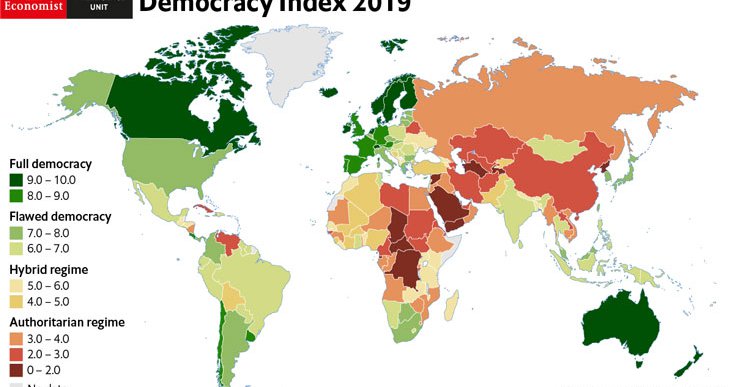
Global regression
Following a global trend, Latin American democracies performed worse in 2019 than in any previous year since 2006. Beyond Latin America, other emerging market countries also suffered from democratic setbacks. India, “the world’s largest democracy” experienced a significant drop in their score due to decreasing civil liberties led by its utranationalist leader Narenda Modi, and Poland became increasingly illiberal through the consolidation of media ownership and the restriction on independence for the judiciary. And there were low and worsening scores across almost all of sub-Saharan Africa.
The democratic crisis also extended into the so-called advanced countries. In particular, the USA has once again fallen short of being classified as a full democracy. US democracy has stagnated in the flawed democracy category after dropping there in 2016, reflecting a lack of confidence in government institutions in part due to the election of Donald Trump. The decline of such a powerful nation, historically acting as the chief exporter of liberal democracy to the world, is a reflection of the challenges of democracy, nationally and globally.
Participation through protest
Poor institutional performance meant that people had to make their voices heard through popular street protests. 2019 witnessed waves of mass mobilisation throughout the world that highlighted an unprecedented challenge to ineffective and narrow democracies, as well as to autocracies.
Globally, these protests have a number of similarities. They are an indicator of dissatisfaction with government performance thanks to dire long-term consequences of the post 2008 crisis-related austerity measures, corruption and failure to deal with issues such as violence and drug trafficking. And yet, there have also been structural failures on the part of governments and the judiciary, and a decline in the effective governance highlighted by the growing gap between the political elite and the general population, alongside a lack of political and societal accountability.
The EIU’s report correlates protest with improved participation and therefore a strengthening of democracy. But there is a contradiction here. It is true that protest indicates people’s desire to hold governments to account. But it is also the case that they are forced to do so on the streets precisely because the formal institutions for democracy are not doing their job adequately, whether because of bias, underfunding, inefficiency, or an excessive reliance on violence. This ambiguity is captured by the correlation the Report notes between improved participation score, on the one hand, and regression in the other measures of democracy, on the other.
Nowhere are these ambiguities better illustrated than in Chile. Despite the level of violence witnessed in the protests in Chile in 2019, the Economist measure of Chile’s increase in political participation seems to mean that it has moved from the category of flawed to full democracy. Yet there were 23 deaths during the Chilean protests caused by the aggression of Chile’s police and army. Should Chile’s democracy score go down because of the repression of protest rather than up because people took to the streets to protest against austerity and price rises? As democraciaAbierta argued in its previous analysis of the Democracy Index, these measurements focus on formal democracy and this has its limitations. Chile generally scores well in such Indexes, relative to the rest of the region, because its institutions appear stronger than elsewhere in Latin America. However, Chile’s response to the protests in 2019 highlights that despite their strong democratic institutions, Chile failed to respect human rights, and this should have been noted in the democracy index of 2019.
In Latin America, both government failures and an absence of accountability have contributed to the challenges democracy faces in the region.
For example, stagnant economic growth and the resulting austerity played a role in the protests in Ecuador, where a reduction in fuel subsidies, alongside other austerity measures included in an IMF plan to rescue its heavily-indebted economy, led to significant protests, particularly by indigenous communities politically active in the country. In Bolivia, meanwhile, protests erupted in response to the electoral crisis and growing divisions in Bolivian society.
Across the region, 2019 clearly demonstrated how democratic participation is still not effectively institutionalised through the formal mechanisms of democracy. Latin America certainly doesn’t lack an engaged civil society that is quick to mobilise, with consistent demand for democratic engagement and citizenship despite failing institutions. But here, political parties, very obedient to the power of oligarchies and vulnerable to corruption, usually fail to deliver, while popular opposition seems to lack enough political agency when it comes to present their alternative policies to elections.
PrintDemocraciaAbierta | Radio Free (2020-02-19T14:29:12+00:00) What’s wrong with democracy?. Retrieved from https://www.radiofree.org/2020/02/19/whats-wrong-with-democracy/
Please log in to upload a file.
There are no updates yet.
Click the Upload button above to add an update.